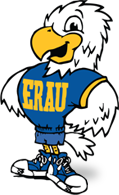I came into ERAU with a less common background. I was in virtual school from 4th through 12th grade. This trained me to prefer a certain type of learning: throw a textbook at me and tell me to learn it by myself. I did and still do really well with this approach. As I attended more and more lectures at ERAU, I survived but noticed that I did not feel 100% comfortable with their type of learning experience. Thus, for any new virtual schooled students or just new students in general, now as a senior, I wanted to share some of the techniques I have developed over the years.
MOST classes here at ERAU, at least the ones in my experience as an EP student, have a distinct system. You attend lectures, do homework, and take exams. I have a certain note-taking/studying system that has worked very well.
I use OneNote to do all of this because I like being able to see everything at a glance. I keep one large notebook; each semester has its own section group. Then, there is a section for each class. Each page is for a day of lecture, homework, or type of note.
- Attend class to take lecture notes
- Focus on writing down what is on the board & any other important things the professor says
- Don’t be afraid to ask “will this be on the exam”
- Ask if you are confused!
- If not already specified by the professor, ask for what part of the textbook things correspond to & what extra practice problems you can do
- Study at home!!
- Take notes on the textbook
- Create another notes page for textbook notes
- I know it can feel wrong to do sometimes, but mark up your textbook!! Highlight definitions in yellow and important facts in blue. And then write notes in the margins or do extra math next to the examples.
- Take notes on any PowerPoint slides or supplemental material on Canvas
- Start homework early to fully understand the problem
- In my opinion, it is okay to use an answer key (if given/permitted by your professor of course) as long as you understand how to get there. In fact, this process can make learning easier sometimes!
- Do any extra practice problems that you can
- If you are confused (or even if you aren’t), take these by the professor’s office hours or email it to them for feedback and extra tips!
- Take notes on the textbook
- Exam time
- Glance through notes, especially for around 15 minutes leading up to the exam. Your short term memory is a powerful tool.
- Redo all of your homework and practice problems on a big whiteboard for a day or so before the exam and see how fast you can get through them. Timing is key in some of these classes!
- Study with your classmates. Even if you feel like you understand the material fully, someone else may have a perspective that will make you go WOAH


